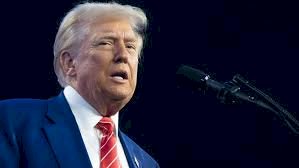Judge rejects Trump's bid to delay Friday sentencing in his hu$h money case
The president-elect is scheduled to be sentenced just 10 days before his inauguration.

A New York judge on Monday denied President-elect Donald Trump's request to delay a sentencing hearing in his New York criminal case scheduled for Friday, just 10 days before his inauguration.
Trump’s attorneys had argued in a filing to state Judge Juan Merchan made public earlier in the day that the court “should vacate the sentencing hearing scheduled for January 10, 2025, and suspend all further deadlines in the case until President Trump’s immunity appeals are fully and finally resolved.”
Merchan rejected that argument in a ruling late Monday.
"This Court has considered Defendant's arguments in support of his motion and finds that they are for the most part, a repetition of the arguments he has raised numerous times in the past," Merchan wrote.
Merchan rejected Trump's bid to dismiss the case in a ruling last week and ordered his sentencing on 34 felony counts of falsifying business records to proceed this week, before his inauguration.
Trump's filing said that he is appealing those decisions to the state Appellate Division later Monday and that he is entitled to an "automatic stay."
That appeal, filed late Monday afternoon, seeks a Jan. 27 hearing date — a week after Trump is inaugurated.
In a statement, Trump spokesperson Steven Cheung called the planned sentencing "unlawful."
"The Supreme Court’s historic decision on Immunity, the state constitution of New York, and other established legal precedent mandate that this meritless hoax be immediately dismissed," he said.
Manhattan District Attorney Alvin Bragg's office had earlier Monday urged the judge to deny the request to delay the sentencing.
Prosecutors noted that a final judgment would allow Trump to move on with his appeals in the case and said the sentencing is happening only now at Trump's insistence.
The "current schedule is entirely a function of defendant’s repeated requests to adjourn a sentencing date that was originally set for July 11, 2024; he should not now be heard to complain of harm from delays he caused," they wrote.
The DA's office also contended that now is "the least burdensome time" for Trump to be sentenced.
"As this Court has noted, and defendant has argued, sentencing a sitting President during his term in office raises heightened and potentially insuperable obstacles.
Defendant has also vociferously objected to being sentenced after the end of his forthcoming presidential term," the prosecutors said.
"By contrast, sentencing on January 10 raises none of these concerns: defendant has no viable claim of presidential immunity from ordinary criminal process" and "is not yet engaged in any official presidential functions that would be disrupted by the sentencing," they wrote, adding that "it would be feasible to complete the sentencing proceeding in less than an hour."
Merchan said in his ruling Friday that he did not plan to jail Trump and that he was likely to sentence him to an unconditional discharge, meaning he would remain a convicted felon but would have no other punishment.
Trump was convicted in May of falsifying records related to hush money his then-attorney Michael Cohen paid adult film star Stormy Daniels in the closing days of the 2016 presidential election. Daniels testified she had a sexual encounter with Trump in 2006, a claim he has denied.
He was initially scheduled to be sentenced in July, but Merchan postponed the proceeding at Trump's request in the wake of the U.S. Supreme Court's ruling setting a new standard for presidential immunity that month.
In a pair of rulings over the last month, Merchan found that the Supreme Court ruling did not affect Trump's conviction in the criminal case.
The judge's ruling Friday said Trump could appear in person or virtually for the sentencing and asked Trump's attorneys to inform him of the decision by Sunday. It is unclear whether they replied or whether their filing is the response.
The DA's filing Monday said Trump had decided to appear virtually but did not state the source





















